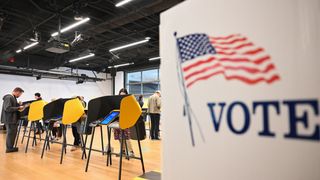After Super Tuesday’s primary vote in 16 states and one territory, Donald Trump and Joe Biden will likely reach near mathematical certainty of being their parties’ candidates for US president.
Polls show most Americans would prefer that neither run but Biden and Trump are effectively incumbent leaders of their parties and in presidential politics the incumbents have a huge structural advantage. Based on historical precedent, one would rather be Biden right now. Only 10 American presidents have lost re-election bids since 1800, when second president John Adams lost to Thomas Jefferson, and Trump was the first incumbent to lose since 1992, when George HW Bush lost to Bill Clinton.
Republicans have lost or badly underperformed in the past three national elections with Trump as their standard-bearer (in 2018, 2020 and 2022).
Most Americans vote based on their wallets, and three-quarters of economists believe the strong US economy will continue through election day in November, with polls suggesting that Biden is starting to get more credit for the economy as inflation wanes.
Trump’s weaknesses were further evident in the defiant campaign of former South Carolina governor Nikki Haley, who pulled 30 per cent to 40 per cent of votes away from Trump in the primaries leading up to Super Tuesday.
For a de facto incumbent candidate that is a dangerously high number of defections within Republican ranks that Trump will have to claw back to have a chance of winning. Then there are the multiple court appearances Trump will have to make, which will mobilise his supporters but take a wrecking ball to his campaign schedule and image with independents.
So why are Democrats so nervous? Because despite Biden’s advantages, his re-election could come down to tens of thousands of votes in swing states such as Pennsylvania, Michigan and Wisconsin.
With the US electoral college system, Biden could win the popular vote by millions (as he did in 2020) but still lose the state-by-state count. And all it might take is a failed foreign policy crisis, an unexpected economic downturn or what really worries Democrats — a “senior” moment for the president on camera.
Australians don’t get to vote in this one, of course. And when The Guardian encouraged readers to influence the 2004 election by writing letters urging voters in a critical county in Ohio to oppose George W. Bush, the locals bombarded the paper with angry replies invoking the American Revolution.
On the other hand, Australians will not want to follow the example of European politicians who melted down at the recent Munich Security Conference, with one hyperventilating German politician claiming Europe could face three authoritarian challengers: Russia, China and the United States. Take a deep breath, please.
Granted, no previous US president has attacked the norms and institutions built by his predecessors the way Trump has.
His focus in a second term will be on retribution against the US Department of Justice and other agencies that he thinks crossed him. His core staff will push for draconian policies on immigration. Climate policies will grind to a halt at the federal level.
Progressive governments abroad will face opposition to working with the US from within their own parties. Trump’s anti-Europe and anti-Ukraine “America First” movement will be sustained by supporters who feel a cultural affinity with authoritarianism and a historic disdain for Europe that goes back to the Republican Party of the 1930s (and really the 19th century). The American people could be in for a rough patch.
Yet, by most metrics, Australia’s alliance with the United States probably came out stronger at the end of Trump’s four years in power — as did US relations with Japan and India. It is worth considering why. First, polls consistently show the American people overwhelmingly support alliances and international engagements, as do most members of congress in both parties, despite the swing votes and megaphone currently being controlled by Trump supporters in a closely divided House of Representatives.
Second, the “America First” movement on the right of the Republican Party is also historically an “Asia First” movement.
Trump’s national security team last time was all about building alliances in Asia to counter China. Their tone on China was more hawkish than perhaps Canberra would like, but their commitment gave Asian allies something to work with. Some argue that those saner forces will not come into a second Trump administration, but there are plenty of candidates in the halls of congress and elsewhere who would.
Third, the strong American economy has continued from Trump through Biden to attract increasing foreign direct investment. The United States has replaced China as Germany’s largest export market and that is unlikely to change with this election. Trump made a lot of noise about destroying trade agreements with Canada and Mexico in 2016 but, when his advisers pointed out how much this would hurt the farmers and ranchers who voted for him, he went back to the table to negotiate.
Finally, leaders such as Shinzo Abe in Japan, Narendra Modi in India, and Scott Morrison in Australia approached the chaos of the Trump administration with a clear-eyed view of their nations’ interests unclouded by the kind of virtue signalling or panic that doomed leaders such as Canadian Prime Minister Justin Trudeau. These leaders in the Indo-Pacific found issues and allies in the administration and congress that helped them do big things such as the US-Australia-Japan-India Quad.
As the British foreign secretary said to his whingeing European counterparts before a summit with Ronald Reagan in the early 1980s: “Yes, everything you say about the Americans is true, but they are the only Americans we have.”
In the same vein, it would be a mistake to just breathe a sigh of relief if Biden is re-elected. Australia and other allies should begin thinking about how to push a re-elected Biden to raise his ambitions on trade policy, which is held hostage because of political sensitivities in swing states such as Michigan. Second-term Democratic presidents often have been freed to push significant trade and defence agreements with allies.
Australians do not get to vote in this election but that does not mean America’s closest allies need to remain passive bystanders in shaping the agenda for a new administration — whichever way this painfully polarising contest goes.






